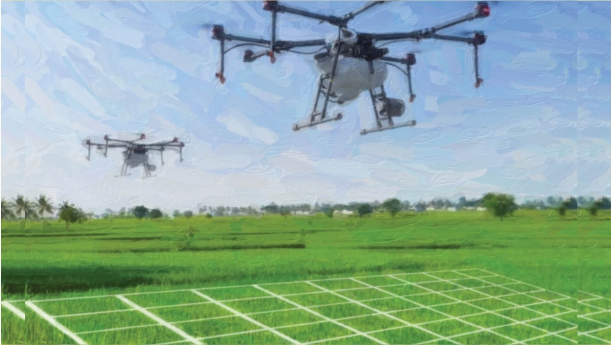
AI-driven agritech solutions hold the potential to eliminate dated farming techniques and unleash the untapped potential of a sector dominated by fragmented land holdings and lack of mechanisation.
Over the last few years, digitisation has become an integral part of our lives and permeated every aspect of it. Technological advancements driven by digital tools and solutions have been pivotal to boosting economic growth and enabling employment generation across the globe. The integration of disruptive technologies like artificial intelligence (AI) into core processes has enabled global businesses to increase operational efficiencies and improve productivity. The Indian government is also leveraging AI-led interventions to expedite the upliftment of rural regions. Bolstering the functional competencies of social sector areas like agriculture, education, and healthcare is the key to fostering sustainable development in villages and building resilience in rural communities.
Agriculture is the mainstay of India’s economy comprising around 18 per cent of its GDP. Farming and allied activities are the chief source of livelihood for more than 65 to 70 per cent of India’s population who live in the country’s villages and hinterlands. There is a greater pressure on the farmer today to maximise food production by increasing the average crop yield per acre to feed a growing population.
AI-driven agritech solutions hold the potential to eliminate dated farming techniques and unleash the untapped potential of a sector dominated by fragmented land holdings and lack of mechanisation. Focused investment in AI technologies can help resolve the problems of disrupted supply chains, boost land productivity, and ensure crop security and sustainability. The rural agricultural ecosystem is set for a complete overhaul with the introduction of future-ready AI-enabled digital platforms like e-mandis. These online marketplaces directly connect the farmers with the merchants facilitating the transaction of agricultural produce in a mutually agreed, transparent manner. They also cut out the unwarranted participation of intermediaries like middlemen in the agriculture value chain. This helps farmers get fair and remunerative prices for their products.
Predictive analytics leverages the power of AI and machine learning to help farmers improve agriculture productivity and reduce crop wastage. AI-driven predictive analytics can help farmers in the rural hinterlands of India to boost per acre crop yield through seasonal forecasting models.
These models enable farmers to predict future weather patterns and make informed decision for scheduling farming activities like crop irrigation. Predictive analytics can be used to provide data-driven insights to farmers to optimise their farming operations, facilitate better crop management, improve agricultural supply management, and increase their profitability. Through the promotion of sustainable agriculture practices in rural areas, AI can help India’s agricultural sector become self-reliant and facilitate the building of empowered farming communities.
The education infrastructure in the rural areas and far-flung villages of India is found to be lacking in several aspects—abysmal teacher to student ratio, dearth of funding and resources, and lack of access to a stimulating learning environment which hampers the development of their cognitive skills and impedes their social and intellectual growth.
AI can prove to be a game-changer in upgrading the standard of teaching and learning in rural areas. By offering an immersive learning experience for students, it helps spark their creative imagination and motivates them to expand their sphere of knowledge. With a keen emphasis on personalised teaching, AI can help in developing customised learning modules to improve clarity in teaching and help students understand subjects in an easy manner.
An acute shortage of teachers in rural areas can be addressed by the deployment of personalised AI chatbots and virtual assistants. Taking into account the aptitude and the behavioural response of students, these personalized assistants can address the doubts of students in an empathetic manner. By accurately gauging the strengths and weaknesses of a student, AI-driven tools will help them to focus on their area of improvement and boost their learning outcomes.
An AI-driven remote learning model can help brilliant students living in villages to gain admission and access to highly specialised degree and professional courses from prestigious global universities. The government needs to identify such students and subsidise their education through affordable loans and scholarships. Innovative AI-enabled technologies have the potential to improve access to quality education, lower dropout rates, and boost students’ learning competencies by providing them an empowered academic environment.
Though India is one of the most populous countries in the world, more than 70 per cent of the healthcare services in the country are provided by the private sector. This has led to quality healthcare becoming inaccessible for the poor, a majority of whom live in rural areas. AI can help in plugging the gaps in the country’s healthcare ecosystem and making it more cost-effective and streamlined.
AI-driven solutions can provide insights to ensure optimal decision-making and improve access to quality healthcare for poor patients in rural areas. Through an in-depth analysis of the personal medical history of patients and keeping track of their disease profiles and related risk factors, AI can facilitate customised treatment interventions for individual patients.
AI-enabled Electronic Health Records (EHRs) systems can be flexible and interoperable, providing clinicians timely access to clinical data of patients. An interoperable AI-enabled EHR enables improved treatment outcomes, helps reduce overhead costs and facilitates data integrity.
By checking the authenticity of patient credentials and verifying their health records and claim applications, AI-powered systems can play a key role in ensuring that benefits of government health insurance schemes reach the intended beneficiaries in rural areas.
AI can be positioned as a people-friendly technology having the potential to bridge the urban-rural divide in the country. The disruptive technology can mitigate risks arising out of societal imbalances and resolve humanitarian and ecological challenges.
AI-led policy interventions can lay the groundwork for bringing a large number of the rural poor in the social and economic mainstream.
Log In or become an AIMA member to read more articles
